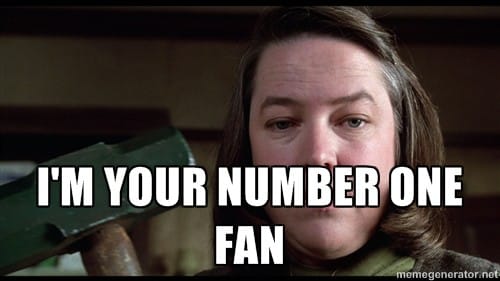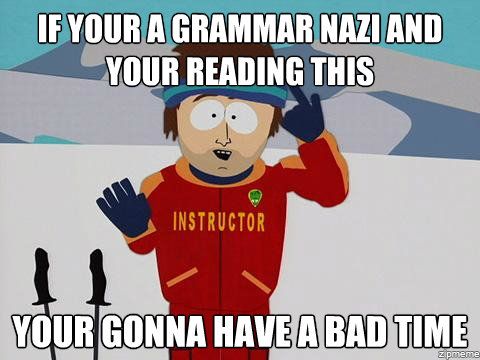I first met Joanna Wiebe from Copy Hackers in 2013. She gave an incredible presentation on “Copywriting that Converts: How to sell without selling your soul“, but the main lesson that I learnt was the difference between people who can write and real copywriters.
 I’m lucky enough to consider Joanna a friend – hopefully she won’t be too disturbed by that. I’m also a great fan of her copywriting blog, and have read most if not all of her excellent Conversion-Boosting Copywriting Ebooks. So I asked her if she wouldn’t mind an interview-style series of questions, thinking she’d either pretend not to get the email or give me a few paragraphs of content.
I’m lucky enough to consider Joanna a friend – hopefully she won’t be too disturbed by that. I’m also a great fan of her copywriting blog, and have read most if not all of her excellent Conversion-Boosting Copywriting Ebooks. So I asked her if she wouldn’t mind an interview-style series of questions, thinking she’d either pretend not to get the email or give me a few paragraphs of content.
Instead she gave me this. It’s quite incredible, and if you have a website, care about selling what you do and communicate with words, you really need to read this. Don’t skim it – there are some absolute gem’s here; read below to understand the suspect punctuation.
Who are you, what do you do and what’s your superpower?
 I’m Joanna Wiebe. I teach copywriting at Copy Hackers – that is, I help businesses grow online using just their words. My superpower, outside of teleporting (look behind you!! i was just there, but now i’m back here), is writing lengthy responses to all questions but the first and tenth.
I’m Joanna Wiebe. I teach copywriting at Copy Hackers – that is, I help businesses grow online using just their words. My superpower, outside of teleporting (look behind you!! i was just there, but now i’m back here), is writing lengthy responses to all questions but the first and tenth.
Why the name Copy Hacker? I looked up “hack” and found this – 6 and 7 definitely don’t apply to you:
 So glad that 3 and 8 apply, though.
So glad that 3 and 8 apply, though.
Copy Hackers was originally called “Copy For Hackers”, but my partner Lance suggested we drop the “for” and just go with Copy Hackers. At the time, “Design for Hackers” had just come out, and we didn’t want to sound like we were associated with that group – not ‘cuz we don’t dig Dave Kadavy (we do!) but ‘cuz, well, we weren’t associated with him. The “For Hackers” thing felt sortuv franchise-y. So we dropped it.
What I continue to like about the name Copy Hackers is that it sounds like we bypass the theory and get to the goods – that’s how it rings for me, at least. And I dig that. Although we do theorize a good deal, we’re also invested in action and experimentation.
If someone is insanely tight for time (I’m sure you can’t imagine that), what advice would you give them about their copywriting/hacking/skills?
This question always troubles me – or, better, answering it does. It seems so short-sighted to say that you don’t have time to work on the only thing connecting you to your prospect: the words on your page or in your email. What else are you doing that’s more important? Admittedly, there are things that are at least as important, like improving a product or fixing bugs. But people aren’t doing those things instead of writing new landing pages and optimizing their email drip campaigns. They’re doing all sorts of little make-work tasks, fumbling with the numbers and reading about other people’s success and trying to figure out easier, faster ways to convert – spending hours watching but not acting on user videos and sitting in pointless meetings – when, meanwhile, their site is bleeding visitors to the tune of 99 out of 100 failing to see why they should sign up, buy, upgrade or refer. Meanwhile, they’re auto-sending emails that had little thought put into them and were written clumsily in the 20 minutes they allocated for that “little job.” Meanwhile, they’re spreading themselves thin across everything except their copy.
Stop doing so many things!
If you had 100 customers in your store, you wouldn’t sit in the staffroom trying to figure out what to do to sell to them. You’d get your butt out there, talk to them, listen to them – and sell to them. If you had salespeople, you’d expect even more! THAT’S what your copy is there to do. Don’t mistake copy as “just words” simply because it’s free to make. Your copy is your online salesperson – and if you rush it or don’t make time to work on it, you’re effectively putting an untrained newbie into a room filled with prospects and letting him/her stand there, rocking back and forth on the spot, ringing in the one or two customers that need what you’ve got so desperately they don’t even need a salesperson’s help.
Now, if you have an hour a day to spend on your copy and you have a lot of copy to write, then I applaud you for at least carving out time… and I have efficient copy shortcuts for you.
Here are some short shortcuts:
- Replace just one word in your headline with an unexpected, unfamiliar synonym. That’s like changing “Accounting software that saves you time” to “Accounting software that saves you many moons.” Instantly, your message becomes more note-worthy – and, thus, more likely to stick. No, I’m not kidding. “Many moons” holds the reader’s attention for a second. “Time” doesn’t even register.
- Use kernel sentences. A kernel sentence is basically “X is Y.” It’s extremely clear. That’s why it’s so powerful. Plus, it’s easy for sixth-grade readers to understand, and that reading level is our target.
- Engage all 5 senses on each page. Your copy today is unlikely to engage even one sense, outside of vision because it must be read with one’s eyes. We are sensory beings, and our brains like texture, salt, heat, cold, motion, burning wood – the list goes on. Read over your copy, and work yer butt off to engage each sense at some point on your page. You’ll find that your copy suddenly feels alive.
And here are the long shortcuts, which pay off bigger in the end and are more than parlor tricks:
- Swipe messages from your customers. (This is the talk to them, listen to them, sell to them idea above.) Send out surveys with open-ended questions that will compel your customers to use real swipe-able words and phrases to tell you what was going on in their lives that brought them to you, what they most wanted to get out of your solution, what they have gotten, and so on. This is the bloody GOLD that great copy is based on. And it takes little more than one hour to craft the survey, 5 minutes to send the survey, 5 minutes to send a “survey closing in 2 hrs” email, and four hours to analyze the survey results in order to find sticky, swipe-worthy messages. Then drop those into your headline, subhead, body copy, click triggers, etc. Done!
- Swipe messages from your prospects. Search Amazon.com for books and/or products that are similar to yours, and pore over the reviews of those products in search of swipe-worthy phrases that speak to expectations, pains and outcomes.
If a small business owner needs persuading that writing better copy should be on their radar, what would you tell them?

Not convinced? Okay, how about you take all the copy off your site and see what happens! Or how about you send a blank email! Go ahead. Do that right now. You send a blank sales email, and I’ll go delete all the words from your website, and then we can talk about whether copy matters or not.
…See? I’m grumpy. 🙂
The only way you can connect with your visitor online is with words. If you have LiveChat, great, but that’s still words – that’s still a chat agent communicating the messages that your prospect needs in order to choose you. Same with video: it’s based on a script, and that script has to be written to capture and hold attention and ultimately move the viewer to action… and we call that copywriting.
Failing to improve your copy is like failing to train your salesperson. Don’t be surprised when they fall flat for lack of investment from the C-suite.
For small businesses: hire a copywriter, outsource copywriting (know anyone?) or learn the skills yourself?
I strongly believe that very small businesses – those with 2-3 people – can and should write their own copy. For two reasons.

So, the second reason you should write your own copy: you care waaay more about your business’s success than any $25/hr copywriter possibly could. You have nothing but skin in the game. You care deeply about your customers; you know how much you’re spending to drive visitors to your site, and you care about those visitors; and you know that your solution solves real problems (or seriously delights) customers. All you need to do is figure out how to channel all that great stuff onto the page in ways that convince and convert. So buy a book or two (ahem) and learn!
That understood, the moment you get to a position of profitability where you have, say, $5000 a month to put toward marketing, do yourself a ginormous favor and hire a great copywriter (with a stellar portfolio and chops highlighted in the blog posts they write) on retainer for about a year. You may be able to get 8-10 hours a week from a super-solid copywriter for $5000 per month, and those 40 hours per month could, within four months’ time, see them overhaul your drip campaigns, create new variations of your landing pages (tested in Unbounce, for example) rewrite your home page and even get you set up with an email→sales page funnel that measurably increases revenue for you. At the end of the year, you’ll be well set-up to bring in an online marketer for the $60K you were otherwise spending, and bring the copywriter’s retainer down to about 5 hours a week.
I’ve seen countless small businesses throw $5000 a month at the flavor-of-the-month marketing technique only to burn through it, shrug their shoulders, and go looking for the next fad. Don’t do that. Please. Save yourself the heartache, and get a great copywriter on retainer for X period of time.
Should SEO be factored in to copy writing? If so to what extent? [No leading question there…]
haha! Ah, Dave. The answer is… yes???
I always consider search and the possibility that my copy can make it easier for my client to attract free high-quality traffic. So I’d say yes – but I’d do so with a big ol’ asterisk. And in the micetype associated with that asterisk, I’d explain:
- Put the visitor first, whether you’re writing “SEO copy” or not
- Be extremely careful before you sacrifice a compelling headline for a “keyword optimized” headline
- Don’t be tricky with your search-optimized copy because tricks quickly lose power in algorithm updates – but really rich content that’s on-point has stood the test of time
- There are many ways to drive traffic to a site, but you need that site to convert visitors, so keep your priorities straight
“I’m not a writer, so should I take the time to learn how or…”?
Good! Better that you’re not a writer. Writers have all sorts of bad writerly habits to break to write copy that converts.
Is there a product you adore and a fabulous market you want to connect that product with? Then you prequalify to write copy – not good copy, mind you, but copy. Then comes the part where you learn how to turn your ho-hum, wobbly-legged, word-shaped air into bold, confident copy. Then comes the part where you practice doing so. And two years from now comes the part where you finally write good copy, which sets you up to write every piece of business communication better from that point on.
Don’t take the time to learn to write copy if:
- You’re independently wealthy,
- You can afford to hire the best freelance copywriters, and
- You have no plans to review the work those freelancers produce for you.
If any of the above is untrue for you, take the time. Learn how. You’re running a business, after all. You don’t get to opt out of the key parts of growing that business just because learning to do it right is inconvenient. I certainly hope you weren’t sold the idea that running a business is easy and takes no training…
Do you have any hacks for split testing? What tool do you recommend?
Tests need hypotheses. So start with a question. You can usually dig up great questions just by looking at your Google Analytics.
For example, you may find that X landing page is getting good traffic, but visitors are bouncing / exiting quickly and conversion rates are lower than on other pages or low compared to the amount of traffic you’re getting to that page.
This is the part where you can get really intense and rigorous – or where you can use shortcuts (so you actually run a test this year, not just in your dreams). A shortcut is to head over to http://fivesecondtest.com/ and upload a screenshot of your page. Then pore over what users say, and use that to feed an hypothesis about what may be going wrong on your page.
To do the testing side of this easily, you’ll ideally already be using Unbounce for your landing pages, which would mean all you have to do to test your hypothesis is click a button to duplicate your page, then edit your page in keeping with your hypothesis, then publish and launch the test.
If you’re not set up with Unbounce, you can install VWO or Optimizely – they’re both easy – on your site and set the test up in those platforms. It’s generally as easy as clicking an element to exclude or change it within those testing platforms.
FYI: For the most confident results, you should set minimums for traffic and conversions before you launch the test. Simply relying on a testing tool to tell you which variation has won has led to countless problems with invalid data. Use calculators like Evan Miller’s to calculate sample size, etc before launching a test.
So use:
- Google Analytics
- Five Second Test
- Unbounce, VWO or Optimizely
- Evan Miller’s calculators
Would you try to persuade someone to split test? If so, how?
The biggest objections to split-testing that I hear most often are:
- I don’t have enough traffic
- It’s hard
- I don’t know what to test
- It’s risky
The fourth objection usually comes when the rubber hits the road and a new variation is sitting in front of them, waiting for their okay to launch the test. In the cases of risk, it’s easy to reduce risk: simply expose the new variation to a smaller percentage of traffic.
Which brings us to the first objection: low traffic. If you don’t have solid traffic and conversion rates that indicate that you have an active customer base online, you shouldn’t split test. It’s okay not to split test if your traffic won’t bear it. Instead, use Five Second Test, UserTesting.com, Hotjar, Crazy Egg – any or all of the above – to learn about your visitors and what they’re stumbling with on your site. Then craft a new page variation. And launch it. Watch your analytics, of course. (Note that I’m not talking about “before and after” testing. I’m talking about optimization without split-testing.)
Secondly, it’s hard to test. Sure it is – especially if you don’t know what you’re doing. It’s hard to scuba dive or drive a car or even read a book if you don’t know how. So you learn. And then you practice. And eventually it gets easier. I think it’s great when a business owner believes testing will be hard; the lie is that testing is easy – and that’s the same lie that makes people think marketing is easy, Adwords is easy, hiring talented people is easy, writing great copy is easy, designing a page is easy. It’s not easy. But it’s extremely rewarding, and you’ll learn things you never knew you could learn – things that marketers throughout the last hundred years would die to have been able to learn.
If you don’t know what to test, test big, bold changes. Those lead to the best insights / learnings. And that’s the real reason to test: not to play a game of experimentation but to learn so you can market better and grow more effectively.
Finally, if you don’t know why you should split-test, learn more about it. Ask more questions. And should you find that you want to measure your marketing to see what really works – instead of taking stabs at it and crossing your fingers – hire experts to handle it for you and relay insights and business results to you.
What’s your biggest grammatical peeve?
haha! I have to laugh because in copywriting we so rarely get to talk about grammar. I am a grammar junkie, secretly – although, admittedly, I make grammar mistakes without realizing. (There are a lot of rules!) One of my favorite writing books is “Grammar As Style”, a brilliant but out-of-print book that every writer should read yearly.

I see this sort of thing a lot: Jesus’.
It should be this: Jesus’s.
Words in the singular ending in ‘s’ – including names – are to be treated like any word and given the appropriate “‘s” when possessive. A way to remember it: Bridget Jones’s Diary. Only words that are plural possessives get ye olde apostrophe sans ‘s’, such as in a phrase like this: the girls’ books.
I also dislike misused semicolons, but they’re a tricky little mark, so I can’t complain too much there. If you’ve ever driven a traffic circle in Canada or the US (not in the UK, where they’re everywhere), you might see the similarities between semicolons and traffic circles: they’re extremely dangerous when used by people who don’t know what they’re doing.
Why do you write your emails with a lowercase subject?
So they’ll stand out! One of the biggest challenges when writing a subject line is to get it noticed in a cluttered inbox. So I use lowercase. Oh, and I just kinda like it.
What are the best and worst aspects of doing what you do?
The best parts:
- I get to practice the discipline of writing on a daily basis
- I get to help businesses reach their market and grow, which means people are getting solutions to their problems and those businesses are able to hire people (yay for employment!)
- I meet insanely cool people – like you! – thanks to events my business allows me to participate in
- I think enough about copywriting problems that I sometimes come up with actual solutions 🙂
The worst parts:
- I have such a hard time saying no to new projects that I rarely write anything for pleasure
- While I’m helping other businesses, I’m failing to focus on my own, which means my visitors aren’t getting the solutions they need and I don’t have time to recruit or train the help I could use
What technology do you use and love, and use and hate? Software, hardware, body implants?
Use and love: Calendly, Gmail, WordPress, Buffer, AdBlock, PayPal, Stripe, Slack, Boomerang, RightSignature, Airstory 🙂 , Yoast, Bounce Exchange.
Use and hate: Infusionsoft, MailChimp and QuickBooks. Okay, I don’t hate them. I have to give Infusionsoft a chance ‘cos I’m just starting out with it. I’m trying to switch from MailChimp to Infusionsoft because, for the money I pay MC and the time I’ve been with them, they sure as hell aren’t trying to do anything to keep me, including totally failing at support and making me pay a premium above the $300+ I already pay just to get access to better split-testing (which is something they should have offered two years ago as part of the core product!). And QuickBooks – it’s just stunningly buggy for a signature product from a massive tech company.
Where would you like your business to be in 5 & 10 years? Realistically.
In 5 years, I need Copy Hackers to be a brand that’s well-respected everywhere business is done in English. 🙂 (Unless I learn to write in other languages!) When people talk about Copy Hackers and forward our blog posts to others, it’s because they want to bring trusted, proven copy and growth recommendations to the conversation.
In 10 years, obviously my volcano lair will be complete, so.

Copy Hackers HQ 2025
Unique ideas for your business
The Demystifier puts practical ideas into your hands. You won't find them elsewhere. Original, actionable and insanely effective.


